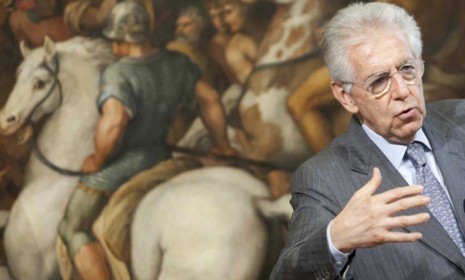The euro crisis: Is Italy the next domino to fall?
With a $125 billion bank bailout for Spain doing little to calm jittery nerves, new fears surface over the debt-burdened economy in Mario Monti's Italy

A free daily email with the biggest news stories of the day – and the best features from TheWeek.com
You are now subscribed
Your newsletter sign-up was successful
This week, European Union officials approved a $125 billion bailout for Spain's banks, in an attempt to prevent the continent's escalating debt crisis from overwhelming Europe's fourth-largest economy. However, markets gave the bailout an unequivocal thumbs down, and Spain's borrowing costs are still shooting up to dangerously unaffordable levels. Now, the contagion appears to be spreading to Italy, Europe's third-largest economy. The yield on its 10-year bonds is hovering above 6 percent, and getting closer to the 7 percent threshold that is widely considered to be the point of no return. Will Italy be the next victim of the debt crisis?
Yes. Italy is in big trouble: "There seems to be little Italy can do to inoculate itself," says Carol Matlack at Bloomberg Businessweek. Since succeeding the unreliable Silvio Berlusconi last year, Prime Minister Mario Monti has "moved decisively to get government finances in order, overhaul the pension system, and implement regulatory reforms." But Italy still has Europe's second-highest debt-to-GDP ratio, and its economy is sliding deeper into a recession. In the short term, there is little Italy can do to prevent contagion.
"After Spain, is Italy the next domino to fall?"
The Week
Escape your echo chamber. Get the facts behind the news, plus analysis from multiple perspectives.

Sign up for The Week's Free Newsletters
From our morning news briefing to a weekly Good News Newsletter, get the best of The Week delivered directly to your inbox.
From our morning news briefing to a weekly Good News Newsletter, get the best of The Week delivered directly to your inbox.
Not necessarily. Italy just needs bolder reforms: Monti must assure markets that Italy "can achieve economic growth and reduce its debts," says Colleen Barry for The Associated Press. On top of what Monti has done already, a robust overhaul of Italy's creaky labor rules and other far-reaching reforms are needed to strengthen investor confidence. But Monti's political support "has become shaky of late, with major parties, unions, and the business lobby criticizing" his cabinet of technocrats. In other words, the main obstacle to Italy's survival is political, and Monti must not allow his government to collapse before he has "pushed through the reforms Italy needs so urgently."
"Italy stuck in recession, feels market pressure"
Italy's fate is in the hands of Europe: "You wonder why people are already speculating that Italy will be next?" says Joe Nocera at The New York Times. "Because there is no investor confidence" that European leaders have solved the root problems of the crisis. The Spanish bailout was a typical example of the "tepid, reluctant, and unconvincing" manner in which European officials have responded to each new flare-up. "They are willing to kick the can — and no more." For Italy and the euro to thrive, Europe needs deeper political and fiscal integration — but it's not clear that Europeans are willing to go to such lengths.
A free daily email with the biggest news stories of the day – and the best features from TheWeek.com
-
 The ‘ravenous’ demand for Cornish minerals
The ‘ravenous’ demand for Cornish mineralsUnder the Radar Growing need for critical minerals to power tech has intensified ‘appetite’ for lithium, which could be a ‘huge boon’ for local economy
-
 Why are election experts taking Trump’s midterm threats seriously?
Why are election experts taking Trump’s midterm threats seriously?IN THE SPOTLIGHT As the president muses about polling place deployments and a centralized electoral system aimed at one-party control, lawmakers are taking this administration at its word
-
 ‘Restaurateurs have become millionaires’
‘Restaurateurs have become millionaires’Instant Opinion Opinion, comment and editorials of the day